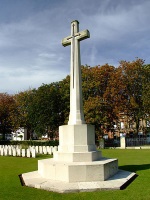Cross of Sacrifice
But the Cross of Sacrifice is not named as such for that reason.
The Cross of Sacrifice can be seen in many Commonwealth War Graves Commission (CWGC) cemeteries around the world, in remembrance of servicemen and servicewomen who died, mainly in the two World Wars.
The design is more or less standard, being a tall Immissa Cross with corniced arms.
The most distinctive feature is the downward-pointing sword, the meaning of which is explained in our Battlefield Cross page.
Why "sacrifice"?
Quite often we read that soldiers gave their lives for the sake of their immediate comrades-in-arms or for their country. But it's more likely that their lives were not given willingly – rather they were sacrificed. There's a huge difference.
Certainly there have been true heroes and heroines who've been asked to perform a task that would quite likely result in their own death. There are relatively few people so brave, even in a battle situation, and certainly not the millions remembered by the Cross of Sacrifice. Only a few join a mission with the willingness to die on that mission, and those who do are on a suicide mission.
Suicide was a crime in Ancient Rome and remains so today in some countries. Most religions consider suicide a sin, since life is a gift from God. But martyrdom is permitted / encouraged in some cases. In war, religious law is often ignored and a suicide attack which significantly harms the enemy is considered honourable. Or terrorism, depending on who and where you are.
There is also a distinction between self-sacrifice and suicide. When a soldier throws themself onto a hand-grenade to save the lives of their comrades, that's self-sacrifice. Death is not their intention. They don't intend to die, they intend to save. Such charity, as we know from John 15:13, is praiseworthy.
A suicide attack includes the deliberate murder of oneself, the intention to die, believing one's death will benefit a greater cause. Suicide is also a complete lack of hope and faith.
The distinction between suicide and self-sacrifice is a matter of intent. A greater distinction is between killing oneself (either suicide or self-sacrifice) and being killed by another (murder or sacrifice).
Murder, whether to oneself or to another, is evil. You cannot achieve good from evil, and if you believe you can, then you've reached your limit of human reasoning and must turn in trust to God.
When killing somebody for the benefit of the killer's country, ideology or anything else, the beneficiary is considered to have more worth than the human, so we might as well refer to it as a god.
Since ancient times, slaves who have outlived their usefulness can still have value by being sacrificed to appease a god. Prisoners of war were useful sacrificial subjects in Hawaii, pre-Columbian Mesoamerica, and elsewhere. Maya and Aztec writings show that the main purpose of some raids on a neighbouring society was to harvest human sacrifice subjects.
Could any modern civilised culture consider human sacrifice to be moral? Of course not. And yet human sacrifice continues in the world's most technologically advanced nations; not by the witchdoctors of bizarre cults that live on the outer edges of society, but by those who have power and lead those "civilized" countries.
Wars, whether directly between opposing powers or by proxy, do not happen accidentally. Wars are not started just because one side "doesn't like" the other side. That might be motive enough for a drunken fight in a pub, but not enough for thousands of unnamed people (volunteer fighters, conscripts and civilians) to be sacrificed for the sole purpose of appeasing the God of Power and Wealth. And guess what? The sacrifices quite often pay off and increase the power and wealth of the powerful and wealthy; hence the continuing popularity of war.
The Cross of Sacrifice is a visible statement to remember those who were sacrificed. It is a statement of profit and loss.
See also Cenotaph, Memorial, Soldier's Cross and Veteran's Cross.

